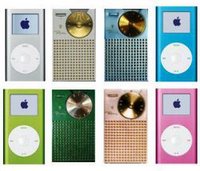« Home | Super Sunday Ratings »
Billboard Radio Monitor Roundtable: Radio Vs. The iPod
 A couple of weeks ago, Billboard's Radio Magazine invited several leaders from the radio industry to talk about the current state of the radio industry and how radio can better compete against new media/digital threats. iPods, how to target today's youth market, new technologies radio should embrace and other opportunities and threats were all discussed.
A couple of weeks ago, Billboard's Radio Magazine invited several leaders from the radio industry to talk about the current state of the radio industry and how radio can better compete against new media/digital threats. iPods, how to target today's youth market, new technologies radio should embrace and other opportunities and threats were all discussed.
The conclusions: Technology may not be the enemy. A challenger at times, certainly, but not the competitive antagonist that many inside and outside the radio industry have made it out to be.
In fact, with high-definition side channels, podcasting and re-energized radio station Web sites, technology has become a requisite collaborator in terrestrial radio's ongoing battle for increased market share, brand extension and revenue building.
While iPods, Internet music destinations and satellite radio present a threat to broadcasters' quest for consumers' time, the medium's own arsenal of technology-driven tools will lead its charge into the future. Joint Communications Corporation's CEO John Parikhal was among the seven industry leaders who gathered Jan. 19 at Billboard Radio Monitor's headquarters in New York, along with executives from Clear Channel, BigChampagne, Greater Media, Edison Media Research, CBS Radio's news WINS New York and Emmis' R&B/hip-hop WQHT (Hot 97) New York.
Joint Communications Corporation's CEO John Parikhal was among the seven industry leaders who gathered Jan. 19 at Billboard Radio Monitor's headquarters in New York, along with executives from Clear Channel, BigChampagne, Greater Media, Edison Media Research, CBS Radio's news WINS New York and Emmis' R&B/hip-hop WQHT (Hot 97) New York.
UPDATE: Now you can download or view the streaming video of the discussion by clicking here.
Among the quotable highlights:"Radio has been attacked from a lot of sides, but it's held up to videogames, satellite radio and iPods," said Buzz Knight, VP of content development for Greater Media. "There are significant challenges ahead, but there's room for optimism. It's a very exciting time."
Tom Poleman, senior VP of programming for Clear Channel/New York, added, "We have an opportunity to reach consumers in new and different ways with the technologies that are out there." With HD side channels, podcasting and on-demand video platforms, "this is an exciting time for radio. We need to ride the wave."
"You don't try to educate listeners; another kid does," said John Parikhal, CEO of Joint Communications. "No matter how much we want people to pay attention to us, a filter goes up. They're spending 70 hours a week with media in an overcommunicated world. If the product is good, they'll eventually pay attention to it."
WINS VP/GM Greg Janoff added, It's about building community and getting listeners to tell their friends about it. Radio is not dead; it just has to reinvent itself. We're the original community builders."
More from John Parikhal: "Radio has never really invented anything—it does a brilliant job of packaging what's already out there. What the industry needs to do is accelerate the rate at which talent gets to radio. Spend the time to train people who want to bring stuff to the medium. Take everything we know about formatting and packaging and teach it to people who want to be on the air, through podcasts. Use formal training methods, and you'll find talented people who could be really good if only they knew how to do radio."
Joe Fleischer, principal of BigChampagne, which tracks traffic on illegal file-sharing platforms, added, "The music industry now realizes that they're not in the business of selling plastic discs anymore. They're now selling content. Unfortunately, they missed the biggest transition since vinyl to CD by three years. Now it's up to them to figure out how to work with everyone that needs content."
One more from John Parikhal: "One of radio's great strengths is repetition. There's nothing worse for a listener than a song that he or she doesn't recognize. It's a balancing act between comfort and introducing new music. The problem for radio today is that young listeners are getting their new music from friends via" instant messaging.
To read the rest of the article, click here
posted by Unknown @ Monday, February 06, 2006,
![]()
![]()















